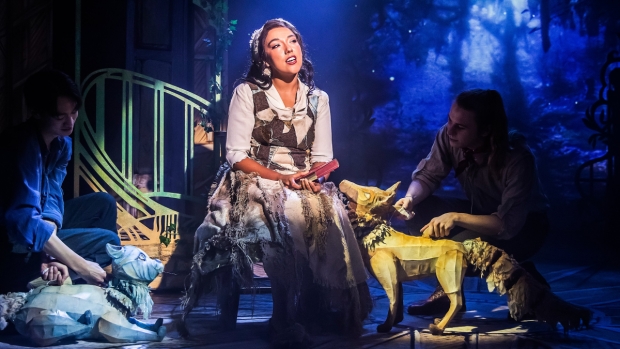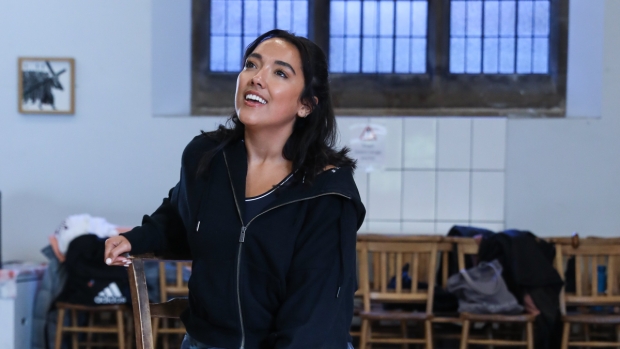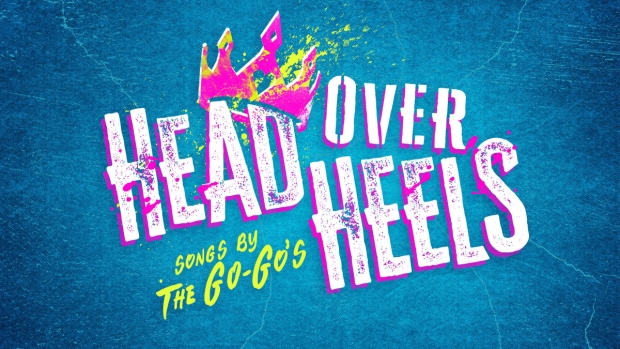Rodgers Hammerstein’s ”Cinderella” at the Hope Mill Theatre – review

© Pamela Raith
Being such a classic and cleanly simple story, the temptation is always to add and augment. Douglas Carter Beane’s book draws it out with two palace events to find Prince Topher’s match, both curtailed by Cinderella’s rushing home. Mirroring their relationship, we also see stepdaughter Gabrielle grow an improbable, illicit romance with a lowly pauper. But the patchy political consciousness, manifesting in sudden bursts, is the most incongruous. As she flees the palace, Cinderella leaves Topher with a blurted plea to help the poor, rather than a passionate goodbye, and at the show’s end he spontaneously decides to birth democracy with new elections for a prime minister.
The show is much stronger at capturing the significance of transformation. Elly Wdowski’s set is formed of plain 2D flats and stencils alchemised by George Reeve’s projections into opalescent skies or woodland with trickling rivers and flecks of light hovering in the mist. Soldiers’ shields become assembled into a horse’s body. It all anticipates the magic of the fairy godmother preparing Cinderella for the ball. A horse and carriage glides through the air as paper lanterns, its drivers gambol onto the stage out of a puff of smoke, and Mouat reemerges in a sky blue gown.
Her winsome smile and glowing face reflect the warmth and brightness of her voice. In “Ten Minutes Ago”, her high, floaty notes sail on the flute to make her sound like she “may never come down to earth again”. Jacob Fowler’s singing voice as Topher seems to go higher as their relationship deepens and lifts him. He moves with the stiffness and tightness of a callow young man straitjacketed by royal duty. Whimpering and ineffectual, he’s more comical than chivalrous, demanding to be called Topher rather than Christopher to normalise himself. When they sing about being out of place, “In My Own Little Corner”, a subtle transition parallels the equal solitude of Cinderella’s kitchen chair and Topher’s throne.
A central stage revolve spins like a carriage wheel or clock, often slowly pivoting the two of them stood together like figurines on a music box. However, they lack full romantic chemistry, largely since Fowler doesn’t manoeuvre from drippy ineptitude to charming heartthrob. Their connection seems to recognise that their mutual unhappy circumstances make them kindred spirits, rather than investing heady infatuation at first sight.
There’s also less darkness or cruelty, especially as one of her stepsisters is actively sympathetic and both are ridiculous rather than grotesque, spiteful or jealous. It’d also be a stretch to call the stepmother “evil” or “wicked”, preoccupied with her advancement instead of terrorising her stepdaughter.
She chastises her own for forgetting they’re “teetering precariously between upper-middle class and lower-upper class”, and the effort with which Annie Aitken constantly holds herself poised and elevated seems as though to droop would set her down an echelon. A matronly martinet, she clips her consonants like she’s plucking feathers. She lets out shrieks and staccato sounds from her shrill, raspingly haughty voice, coarse as though any sweetness has been sanded down.
It’s the first show the Hope Mill’s artistic directors, Joseph Houston and William Whelton, have made together since opening the venue in 2015. They chose this for their love of the story, and with a production as enchanting as this, there’s every chance you will too.













